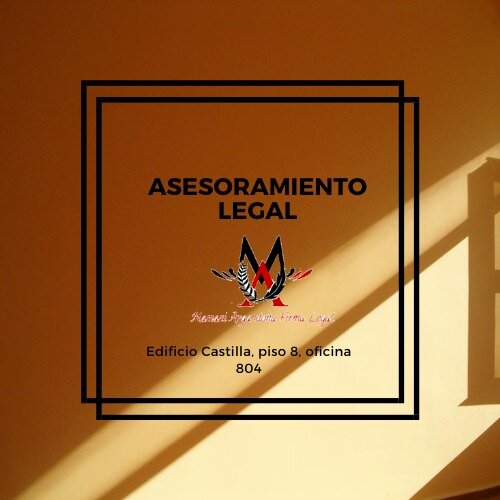Best Debt Capital Markets Lawyers in La Paz
Share your needs with us, get contacted by law firms.
Free. Takes 2 min.
List of the best lawyers in La Paz, Bolivia
About Debt Capital Markets Law in La Paz, Bolivia
Debt Capital Markets (DCM) refer to financial markets where companies and governments can raise funds by issuing debt instruments such as bonds, notes, and other securities. In La Paz, Bolivia, DCM functions as a crucial component in the country's financial ecosystem by allowing both public and private entities to obtain long-term capital for development, infrastructure, and business growth. The Bolivian legal framework provides specific rules for the issuance, trading, and management of debt securities, ensuring transparency and investor protection within the local market.
Why You May Need a Lawyer
Navigating Debt Capital Markets requires an in-depth understanding of complex legal and regulatory requirements. Common scenarios where legal advice becomes essential include structuring a bond issuance, complying with securities regulations, drafting and reviewing prospectuses, handling cross-border investment rules, and resolving disputes related to debt securities. A specialized lawyer can assist in due diligence processes, ensure regulatory filings are correctly completed, and help structure transactions to achieve the most favorable outcomes while complying with Bolivian law.
Local Laws Overview
The debt capital markets in La Paz, Bolivia, are primarily regulated by laws under the supervision of the Autoridad de Supervisión del Sistema Financiero (ASFI) and the Bolsa Boliviana de Valores (BBV), the local stock exchange. Key aspects of local laws include:
- Registration and approval: All public offerings of debt instruments must be registered and approved by the authorities.
- Disclosure obligations: Issuers are required to provide detailed disclosures in the prospectus to ensure transparency for investors.
- Ongoing compliance: Issuers must regularly report financial and operational information post-issuance.
- Investor protection rules: Regulations are in place to protect minority and retail investors from unfair practices.
- Foreign participation: Cross-border transactions and investments are subject to particular rules and may attract additional regulatory scrutiny.
- Secondary market trading: Debt securities are traded on the BBV, and their transfer is regulated to ensure transparency and efficiency.
Frequently Asked Questions
What types of debt instruments can be issued in La Paz, Bolivia?
Common instruments include corporate bonds, government bonds, short-term notes, and promissory notes, each subject to specific regulatory requirements.
Who regulates debt capital markets in Bolivia?
The main regulatory authorities are the Autoridad de Supervisión del Sistema Financiero (ASFI) and the Bolsa Boliviana de Valores (BBV).
What is the process for issuing a bond in Bolivia?
The process involves preparing a prospectus, registering the instrument with the ASFI, obtaining approval from the BBV, and complying with disclosure requirements.
Can foreign investors participate in Bolivian debt markets?
Yes, but they must comply with additional disclosure and regulatory requirements regarding foreign investment rules.
What information must be disclosed in a bond offering?
Issuers must disclose financial statements, risk factors, terms and conditions of the securities, and any other information required by law to protect investors.
Are there restrictions on who can buy or sell bonds in Bolivia?
Generally, any individual or institutional investor may participate, subject to due diligence and compliance with anti-money laundering regulations.
What are the tax implications for investing in bonds in Bolivia?
Interest earned on debt instruments may be subject to local income or withholding tax, and it is advisable to consult a tax lawyer for specific implications.
How are investor disputes handled?
Disputes are usually resolved through negotiation, but can be escalated to regulatory bodies or local courts if required.
What ongoing obligations do issuers have after the issuance of debt securities?
Issuers must submit periodic financial reports, notify regulators of significant events, and ensure timely payment of interest and principal to investors.
How can a lawyer help with a debt restructuring or default situation?
A lawyer can negotiate with creditors, design restructuring plans, ensure compliance with the law, and represent clients in any legal proceedings.
Additional Resources
For further guidance and information, the following Bolivian organizations and authorities are particularly helpful:
- Autoridad de Supervisión del Sistema Financiero (ASFI): Supervises and regulates the financial markets, including debt capital markets.
- Bolsa Boliviana de Valores (BBV): The primary stock exchange in Bolivia where most debt securities are listed and traded.
- Ministry of Economy and Public Finance: Issues sovereign bonds and provides regulatory updates.
- Local law firms specializing in financial and securities law: Essential for personalized legal advice and assistance.
Next Steps
If you are considering entering the Debt Capital Markets in La Paz, Bolivia, or need specific legal advice, it is recommended to consult a specialist finance lawyer with experience in the local market. Prepare all relevant documentation, list your objectives, and gather details about the transaction or issue you are facing. Contact the BBV or ASFI for any regulatory inquiries, and consider scheduling an initial consultation with a reputable law firm in La Paz. This will help ensure you meet all legal requirements and safeguard your interests throughout the process.
Lawzana helps you find the best lawyers and law firms in La Paz through a curated and pre-screened list of qualified legal professionals. Our platform offers rankings and detailed profiles of attorneys and law firms, allowing you to compare based on practice areas, including Debt Capital Markets, experience, and client feedback.
Each profile includes a description of the firm's areas of practice, client reviews, team members and partners, year of establishment, spoken languages, office locations, contact information, social media presence, and any published articles or resources. Most firms on our platform speak English and are experienced in both local and international legal matters.
Get a quote from top-rated law firms in La Paz, Bolivia — quickly, securely, and without unnecessary hassle.
Disclaimer:
The information provided on this page is for general informational purposes only and does not constitute legal advice. While we strive to ensure the accuracy and relevance of the content, legal information may change over time, and interpretations of the law can vary. You should always consult with a qualified legal professional for advice specific to your situation.
We disclaim all liability for actions taken or not taken based on the content of this page. If you believe any information is incorrect or outdated, please contact us, and we will review and update it where appropriate.










